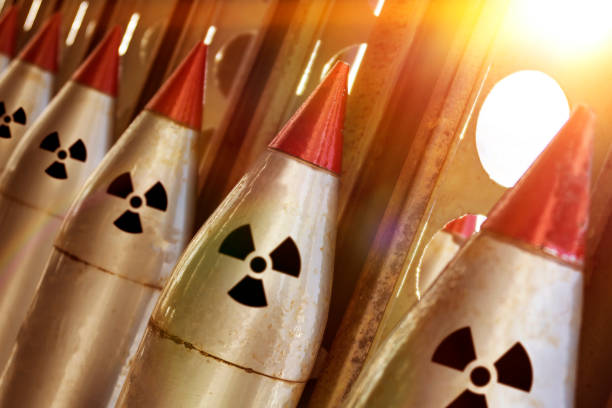UPDATE: Nuclear signatories urged to strengthen treaty, eliminate nuclear weapons
New York, August 1 – The 191 signatories of the Nuclear Non-Proliferation Treaty (NPT) started a month-long review of efforts to prevent the spread of and to disarm nuclear weapons. They were warned that the war in Ukraine, nuclear threats and conflicts in the Middle East and Asia could threaten humanity.
UN Secretary-General Antonio Guterres said state parties to NPT must find “practical measures that will reduce the risk of nuclear war and put us back on the path to disarmament. We need to strengthen all avenues of dialogue and transparency. Peace cannot take hold in an absence of trust and mutual respect.”
He said reducing the risk of war is not enough and called for “eliminating nuclear weapons as the only guarantee they will never be used… This must start with new commitments to shrink the numbers of all kinds of nuclear weapons so that they no longer hang by a thread over humanity.”
Guterres told the delegates that the world is at a time of “nuclear danger not seen since the height of the Cold War” and the review session is “an opportunity to hammer out the measures that will help avoid certain disaster, and to put humanity on a new path towards a world free of nuclear weapons.”
“All this at a time when the risks of proliferation are growing and guardrails to prevent escalation are weakening,” he said, “And when crises — with nuclear undertones — are festering from the Middle East and the Korean Peninsula to the invasion of Ukraine by Russia, and to many other factors around the world.”
Rafael Grossi, Director General of the International Atomic Energy Agency (IAEA) said the war in Ukraine “so grave that the specter of a potential nuclear confrontation, or accident, has raised its terrifying head again.” He added that the situation at the Zaporizhzhya nuclear plant in Ukraine is becoming “more perilous by the day.”
The 10th review, under the presidency of Ambassador Gustavo Zlauvinen of Argentina, is taking place in the UN General Assembly in New York – August 1 to 26 – and has brought the largest numbers of ministers, government officials and organizations under the Covid-19 pandemic.
The NPT, which entered into force in 1970, seeks “to prevent the spread of nuclear weapons and weapons technology, to promote co-operation in the peaceful uses of nuclear energy and to further the goal of achieving nuclear disarmament and general and complete disarmament.”
The review of the NPT occurred every five years. The 10th review had been scheduled to take place in August 2020 but was postponed because of the pandemic. Delegates are now called to evaluate the implementation of the treaty’s provisions since 2015, and “identify the areas and means through which further progress can be made.”
The United States, Russia, United Kingdom, France and China are all NPT signatories and are officially recognized as countries with possessing of nuclear weapons. They are also permanent members of the 15-nation UN Security Council which is responsible for global peace and security. Those nuclear-weapons states, as they are called, have committed themselves to achieve “total elimination of their nuclear arsenals.”
India, Israel, Pakistan and North Korea possess nuclear weapons but have refused to join the NPT.
The US-based Arms Control Association – https://www.armscontrol.org/
“This review conference comes a quarter-century after state-parties agreed on the indefinite extension of the NPT at the 1995 Review and Extension Conference. As states-parties seek to reach agreement on ways to reaffirm their support for the treaty and its implementation, several issues could prove to be contentious including the impact of Russia’s invasion of Ukraine on the nonproliferation system and the failure of the nuclear-armed states-parties to meet their NPT Article VI disarmament obligations and goals outlined in the action plan adopted at the 2010 Review Conference,” the association said in a media advisory.
The review will have to deal with major concerns, including a plan by the United States and United Kingdom to sell nuclear submarines to Australia which experts say may violate the NPT because the submarines use highly enriched uranium that is forbidden by the treaty.
Nuclear Proliferation Prevention Project
Just before the opening of the 10th review session, US arms experts at the Nuclear ProliferationPrevention Project (www.NPPP.org) urged US President Joe Biden not to proceed with the planned sale to Australia of eight submarines fueled by highly enriched uranium (HEU), arguing it would “undermine the nuclear nonproliferation regime.” The sale is part of a project involving Australia, United Kingdom and United States (AUKUS).
Alan J. Kuperman, professor at the University of Texas at Austin and coordinator of NPPP, said, “For half a century, the world has phased out bomb-grade uranium fuel to reduce proliferation risks. But now the United States would export massive quantities of it as submarine fuel, creating a precedent for other countries to demand the same right to import or produce their own HEU – which would be game-over for nonproliferation.”
By J. Tuyet Nguyen
United Nations correspondent journalists – United Nations correspondent journalists – United Nations correspondent journalists – United Nations journalism articles – United Nations journalism articles – United Nations journalism articles – United Nations News – United Nations News – United Nations News
UPDATE: Nuclear signatories urged to strengthen treaty, eliminate nuclear weapons Read More »

